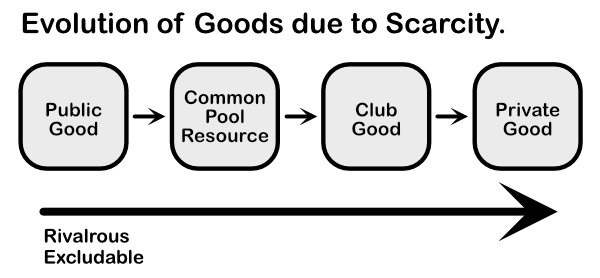Four Types of Goods
| Excludable | Non-excludable | |
|---|---|---|
| Rivalrous | Private Goodsfood, clothing, cars, houses, parking spaces |
Common-pool Resourcesfish stocks, timber, coal, grazing commons, free public transport |
| Non-rivalrous | Club Goodscinemas, private parks, encrypted TV services, public transportation |
Pubic Goodsbroadcast radio, air, national defense, free open-source software |
I think this model is misleading, since both CPRs and club goods are actually rivalrous. It is true that club goods are not rivalrous for members of the club, but they become more rivalrous for those outside the club. Also, it seems to me that the difference between CPRs and club goods is rather nebulous. I suspect that there is a gradation from ostensibly owned by everyone to owned by the club members. Is a CPR management group qualitatively different from a club?
Many resources become more scarce as human population and technology make them more useful. I posit that the four types of goods have a natural or default sequence driven by increasing scarcity. In hunter-gatherer days when people had the same population density as bears, land was not scarce. As population increased, hunting grounds became the norm. Later in colonial America, land became club goods, owned by e.g. the Virginia Company and the Massachusetts Bay Company. Finally, when land became really scarce, it evolved to private property. Many goods followed this sequence, some skipping either the CPR or club goods stage.

